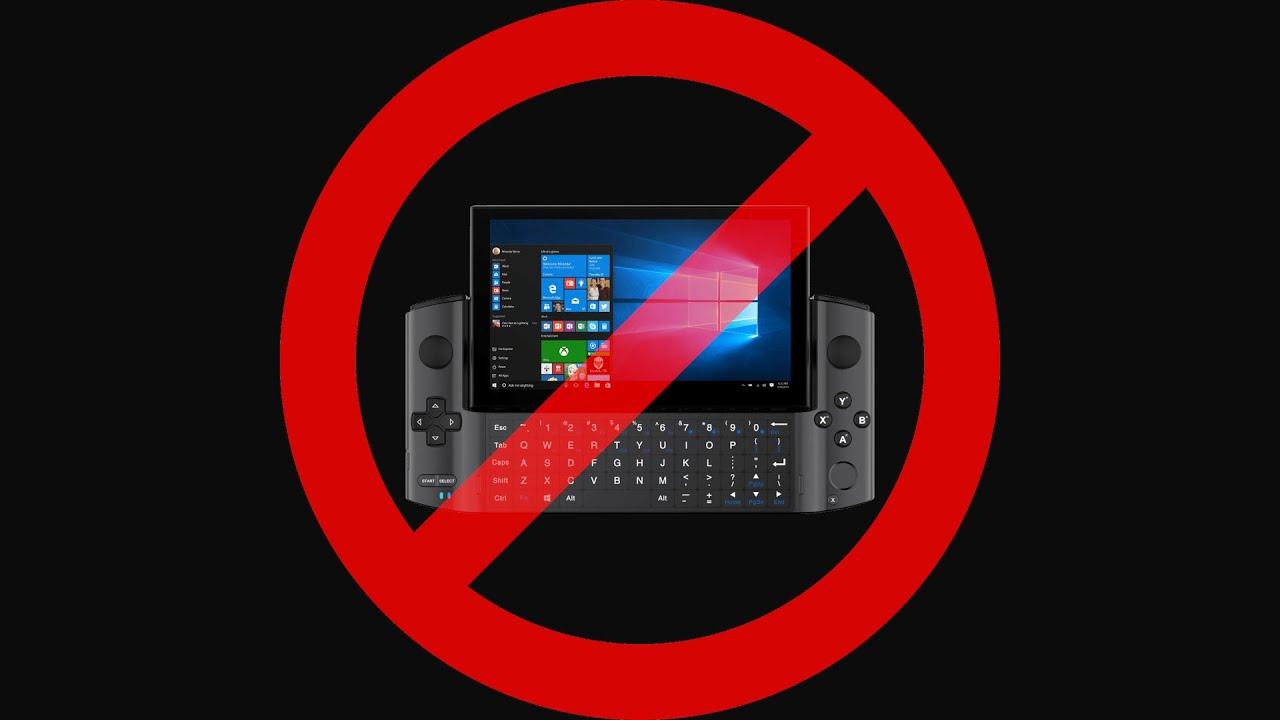Think GPD are a trustworthy company to buy devices from? Well, with the Steam Deck now here, they appear desperate.
Recently, they started taking various Steam Deck videos from YouTube creators, sticking them together with a look at their own devices and not crediting any of the people who put the work into those videos. On top of that, GPD has been attaching a "Creative Commons Attribution license (reuse allowed)" license to the videos, again, without permission from the original creators.
It's not a good look, and some of those creators have started fighting back.
When pulling them up on it on Twitter, I expected some sort of reply (even a snarky one to my obvious bait) or just to do the honourable thing to correctly get permission for using videos from other people. At the very least slapping in a link to the channels they're pinching things from in the description / a pinned comment for people to see. Did any of that happen? No. Instead, here's the official response from GPD:

I've never personally used one of their devices, and would have happily taken a look at any point with Linux installed onto one. Even some direct Steam Deck comparisons. Now though? This is not painting a good picture of GPD as a company.
Here's my video explainer:

Direct Link
This is the same company that previously tried to steer people towards them instead of Valve, because the Steam Deck was going to be a "closed system" that would not allow third-party stuff and wouldn't play pirated games because of SteamOS — something that's just laughable really.
Being a happy owner of several GPD devices (as well as recently a Deck), the first thing I thought when I saw the steam deck announcement was: These guys are screwed.
And I can't help but feeling sad about it :/ The've pioneered the whole handheld gaming thing and made that a reality several years before valve came and announced the Deck. Their products *worked* as a steam gaming device way before Valve even thought this was a good idea, they basically did the market research for them. It's sad to see them now being run out of business by the bigger corporation. Valve is selling the deck at a loss because they can afford it, and that will take care of killing off the "competition". But such is the brutal world of business ¯\_(ツ)_/¯
Anyway, I don't like people abusing copyright law to do stupid things. They are obviously in the wrong about this, but I don't think rehashing what everybody agrees with would contribute much to the discussion at this point.
Some people seem to forget that valve has spent a vast amount of time on "Gaming On Linux", the sheer amount of effort behind proton is staggering, the development of proton also helped wine itself get better overall.
GPD had the warning signs years in advanced, they didn't react and try make a more affordable device for the masses. now that valve has done so after waiting until proton was in a mature enough state, GPD is salty.
I don't think valve had intention to push these smaller businesses out but they did have ample amount of time to change their business plan.
they are even more desperate than that:
https://www.reddit.com/r/SteamDeck/comments/som87v/gpd_steam_deck_is_worse_than_win_3_it_is_a_closed/
Ohoho man, this is really something to read. Like, this might be the first time I've seen a supposedly professional company say piracy is a "feature", but to call a linux platform "closed" is something else. At best they have a case for SteamOS's immutable file system being technically "closed" outside of flatpaks but that's fixed with a few commands in the terminal, and they're comparing a like, $1,300 handheld to a $400 one.
I can buy that this was an official response though, On a certain video game related anonymous imageboard every steam deck thread has someone shilling GPD and talking crap about the steam deck, I just didn't think it was THIS bad on their end.
Yeah you are deffo missing something. Looks like you're oversimplifying it, It's not as simple as just reporting it, you need to be able to proove it and youtube do a thorough investigation into the claim.Ah, ok, thanks. It's not the same as a DMCA strike then. I wasn't oversimplifying on purpose.
Last edited by Philadelphus on 7 Apr 2022 at 6:11 pm UTC
Yeah you are deffo missing something. Looks like you're oversimplifying it, It's not as simple as just reporting it, you need to be able to proove it and youtube do a thorough investigation into the claim.Unfortunately, this is not true and YouTube has been under heavy flak for their strongly abusable claim system.
Basically, as soon as someone creates a claim, that claim is valid.
It can be disputed, of course, but guess who has the burden of proof: It's not the claimer (claimant?).
Only once that dispute has been denied by the claimer, can the victim get YouTube involved.
And good luck getting anyone from YouTube involved to take your side in such a case... it takes a LOT of time, effort and ultimately money.
If you get three of those strikes before any of them can be cleared up, your channel is subject to termination.
At the very least, you won't be able to upload more videos before those are cleared up.
If all of this sounds heavily rigged, then yeah, that's because it is.
Chinese companies, regardless of their size or reach, usually have a whole different concept of copyright infringement, so zero surprises here.
This reminds me of Xiaomi theme store that is basically filled with the usage of copyrighted content without permission.
Chinese companies, regardless of their size or reach, usually have a whole different concept of copyright infringement, so zero surprises here.
This reminds me of Xiaomi theme store that is basically filled with the usage of copyrighted content without permission.
Well, Facebook is basically filled with the usage of copyrighted content without permission, too...
They keep attacking Steam deck in thier video on EVERY TITLE.
And video footage is also stole from Youtube.
If there is anyone want to know what GPD post. I'll try to translate them.
https://space.bilibili.com/13258977/video
... and I understand Liam very good. Being blocked for no good reason feels bad, and having the possibility to react publicly on it and being seen on Google feels good. Been there, done that. :)
Valve is selling the deck at a loss because they can afford it
Can you link to the info/BOM that has that regards costings?
Come on, you know I can't do that. Nobody can, because this is undisclosed private information. If I really had this information (who knows!), it would be a breach of NDA. :)
But my point is that many people seem to agree that Valve is selling the lowest tier at a loss. You may think $400 is a lot if you're measuring against the switch (~30% increase), but fitting an actual PC in this form factor with an x86 architecture, plus all the research work in prototyping and ergonomics, design their custom chip...? And you must take into account that it's their first time doing this (it's not like they had an established process to design handheld consoles like Nintendo).
Moreover, you look at the competition and see no other company out there has been able to sell a similar product at this price point. Are all the steam deck competitors ripping off their customers by charging enormous benefit margins (i.e. selling <$400 hardware for >$1000)? Of course valve has the benefit of having loads of cash and can affort to do mass production, but it doesn't look like they're doing it right now: How many are still waiting on Q2 or Q3 orders? If anything, production looks like it has been quite slow.
All these things add up, and honestly from the outside it seems like a huge risk for them. Like every other Linux enthusiast, I want them to succeed! But honestly they're either *very* optimistic about their potential sales figures or they're selling at a loss and hoping for a revenue increase from people purchasing more steam games. Or maybe they're doing out of love for the linux community, but I'm not that naive.
But anyway, what do I know about business? I'm just a random dude on the internet! If you believe anything I just said, joke's on you.
Valve is selling the deck at a loss because they can afford it,I honestly doubt that.
This isn't a console that can make up for selling at a loss with absurd stuff like costs-to-play-online or generally overpriced games.
Nor is it going to bring it tons of new customers - I'd bet that 99% of buyers are Steam customers anyway.
Nail meet hammer...
My thoughts exactly, Not at all convinced the likes of M$/Sony sell them at a loss either.
Until any company release actual BOM of the devices it's all pure speculation/rumor.
But my point is that many people seem to agree that Valve is selling the lowest tier at a loss.
It's still speculation, No info regards actual pricing has been released from Valve.
I certainly not disputing that they may be barely profiting on some.
Most know that what price for materials that are seen to joe average can and often is very different to what an individual company will be paying.
Not sure why that's such an incredible claim, the concept of a [loss leader](https://en.wikipedia.org/wiki/Loss_leader) has been around—as in, documented that people and companies have done this exact thing—for at least half a century.Valve is selling the deck at a loss because they can afford it,I honestly doubt that.
This isn't a console that can make up for selling at a loss with absurd stuff like costs-to-play-online or generally overpriced games.
Nor is it going to bring it tons of new customers - I'd bet that 99% of buyers are Steam customers anyway.
Nail meet hammer...
My thoughts exactly, Not at all convinced the likes of M$/Sony sell them at a loss either.
Until any company release actual BOM of the devices it's all pure speculation/rumor.
But hey, show me a list of components that produce a device with the same features and specs as the Steam Deck and which cost less than $400 and I'll believe it.
Not sure why that's such an incredible claim, the concept of a [loss leader](https://en.wikipedia.org/wiki/Loss_leader) has been around—as in, documented that people and companies have done this exact thing—for at least half a century.
Ok...
But hey, show me a list of components that produce a device with the same features and specs as the Steam Deck and which cost less than $400 and I'll believe it.
... but volume discount has been around—as in, documented that people and companies have done this exact thing—for millennia.
I don't think anybody says that selling below cost is an incredible claim. It's just that we don't know for sure, and probably never will.
What a bunch of assholes.
True, I neglected that fact. But since it has been around so long, presumably we could look at history to make some sort of educated guess, right? Like, if I can put together a list of components that matches the Steam Deck for $500, is it reasonable to suppose that Valve have managed to shave >20% off the price to get it below $400? Or is the problem that there are so many components going into the Deck (all with their own independent economies-of-scale) that it's just impossible to make any sort of informed estimate about what Valve might (or might not) be able to achieve?But hey, show me a list of components that produce a device with the same features and specs as the Steam Deck and which cost less than $400 and I'll believe it.
... but volume discount has been around—as in, documented that people and companies have done this exact thing—for millennia.
But since it has been around so long, presumably we could look at history to make some sort of educated guess, right?
I really don't know. I mean, I don't know the answer, and I don't even know if we can make an educated guess or if we would be miles from reality. What are you paying if you buy 100.000 instead of 1, or if you got kind of a electronic part subscription?!? Don't ask me. :) I'd guess public information would be sparse.
Personally, I guess I'm basing my impression that they're not making money on the lower tier units from the fact that all three SKUs are identical in performance; the only differences are the SSD and the etched glass on the high-end model (and technically the included case, but from what I've seen of it—while nice—it can't be costing them more than a few bucks extra). But it surely can't cost them an extra $150 dollars to go from 64 to 256 GB and then another $150 to go from 256 to 512 GB, right? Like, there's no way the rest of the system costs, say $350 dollars, then the 64 GB SSD costs $50 and the 256 SSD costs $200, right?* (Admittedly, it's hard to guess how much the etched glass screen costs compared to the default.) So it seems to me that the price differences must be from something other than the pure cost of parts, and to me the most logical explanation is that they're actually making money on just the high-end (or maybe the middle-tier) models, and losing it on the low-end ones as a loss-leader (betting that they'll make up the price difference in Steam sales). I dunno, I could be completely off-base with this assessment. That's just how it seems to me.
*Unless that's how SSD prices actually are at that form factor; it has been years since I last bought one.
True, I neglected that fact. But since it has been around so long, presumably we could look at history to make some sort of educated guess, right? Like, if I can put together a list of components that matches the Steam Deck for $500, is it reasonable to suppose that Valve have managed to shave >20% off the price to get it below $400? Or is the problem that there are so many components going into the Deck (all with their own independent economies-of-scale) that it's just impossible to make any sort of informed estimate about what Valve might (or might not) be able to achieve?But hey, show me a list of components that produce a device with the same features and specs as the Steam Deck and which cost less than $400 and I'll believe it.
... but volume discount has been around—as in, documented that people and companies have done this exact thing—for millennia.
Why does a glass for storing self made jelly cost more then a glass of jelly? What does the jelly production cost? How much discount does the factory get on glasses? Are they selling the jelly at a loss?
Remember that consumer hardware is distributed with a lot of risk-management, postproduction and middlemen.
Packaging (even if sold as *bulk), multiple deliveries from factory to warehouse to warehouse to warehouse. Storage. Big resellers might jump some middlemen, yet they have their own infrastructure to care about.
Factory-to factory delivery with minimal storage is a lot cheaper then that. Also, Valve have taken over support for the chips, which was probably part of the bargain.
Considering the APU, you need to also factor in that this is a new platform for AMD so having a big customer to scale up a production line and proving the value for this will pay of for them twice. Contrary to their much more custom work for other consoles, this is a platform they can sell to multiple customers.
GPD, Aya etc. probably don't get continous factory-to-factory delivery. They buy the hardware in bulks and each bulk gets a new contract... They are probably not producing their units continuously, instead buying time-frames at some contractor. Every time that contractor changes context, things need to be rearranged, which costs a LOT of money. Valve maintain flow, only increasing production and further optimizing the workflow.
So they get the hardware a LOT cheaper and also production is a lot cheaper for them. This all comes with a lot of risk, because the money they need to put into that whole pipeline is immense and it will only pay out if demand keeps up. So, even if we knew how much Valve pays for the hardware, you can't really factor in the risk they take and companies like Aya and GPD simply don't/can't.
Last edited by const on 9 Apr 2022 at 10:00 am UTC









 How to set, change and reset your SteamOS / Steam Deck desktop sudo password
How to set, change and reset your SteamOS / Steam Deck desktop sudo password How to set up Decky Loader on Steam Deck / SteamOS for easy plugins
How to set up Decky Loader on Steam Deck / SteamOS for easy plugins
See more from me